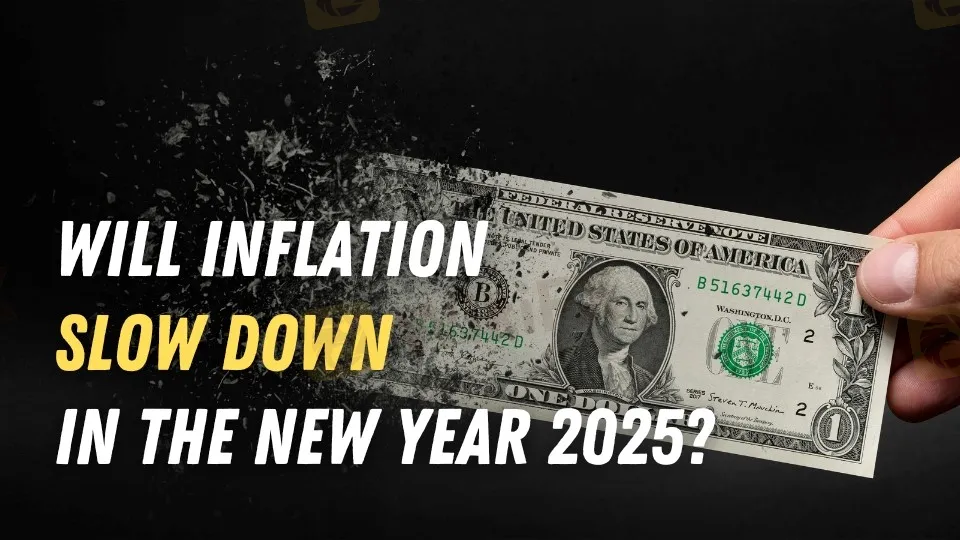简体中文
繁體中文
English
Pусский
日本語
ภาษาไทย
Tiếng Việt
Bahasa Indonesia
Español
हिन्दी
Filippiiniläinen
Français
Deutsch
Português
Türkçe
한국어
العربية
Will Inflation Slow Down in the New Year 2025?
Abstract:Will inflation slow down in 2025? Experts weigh in on projections, economic policies, and potential impacts, offering insights into what the new year may hold.

Inflation dominated economic debates in 2024, and analysts say it will be a major worry in 2025. Inflation projections vary greatly, affected by economic policy, global trade dynamics, and consumer behavior. The Federal Reserve and independent economists have provided several projections, providing a complicated picture of the coming year.
Inflation Forecasts for 2025
The Federal Reserve expects core Personal Consumption Expenditures (PCE) inflation to reach 2.5% in 2025, then fall to 2.2% in 2026, and converge with the long-term target of 2% by 2027. Bloomberg polled independent economists, who were slightly less hopeful. While they agree on a 2.5% core PCE inflation rate in 2025, they expect a slower decrease, with inflation settling at 2.4% in 2026.
President-elect Trump's economic proposals, including tariffs on China and other trading partners, probable immigration restrictions, and corporate tax cuts, have been flagged as possibly inflationary. These actions have the potential to aggravate price pressures and delay consumer relief.

Diverging Economic Outlooks
Some analysts, notably Nobel Prize-winning economist Joseph Stiglitz, are more pessimistic. Stiglitz has warned of a potential “inflationary spiral” that could result in retaliatory trade wars, impacting economic development. Similarly, BNP Paribas predicts that inflation will climb sharply from late 2025 to 2026. The Consumer Price Index (CPI) is expected to rise to 2.9% by the end of 2025 and 3.9% by the end of 2026, according to the BNP. The business also anticipates the Federal Reserve to keep interest rates unchanged until 2025, with no monetary easing.
Deutsche Bank shares the BNP's prediction, while other Wall Street firms anticipate two to three rate cuts in 2025, which is more in line with the Federal Reserve's projections. This discrepancy highlights the uncertainties surrounding inflationary trends.
Consumer and Market Effects
Consistent price increases in industries such as housing, insurance, and healthcare are likely to keep consumer spending under pressure. Shelter costs are likely to fall slightly in 2025, but they may stay high, adding to sticky inflation in the services sector. This could result in minimal respite for everyday bills.
There are certain advantages, though. The US economy has exhibited amazing resiliency, with strong growth, healthy consumer spending, and low unemployment rates giving a solid platform for 2025.
Final Thoughts
While estimates vary, the agreement is that inflation will be a significant issue in 2025. Key factors influencing price trajectory include trade policy, labor market developments, and Federal Reserve decisions. As consumers and businesses negotiate the uncertainty of the new year, they will need to keep an eye on these trends.

Disclaimer:
The views in this article only represent the author's personal views, and do not constitute investment advice on this platform. This platform does not guarantee the accuracy, completeness and timeliness of the information in the article, and will not be liable for any loss caused by the use of or reliance on the information in the article.
Read more

Boosted by U.S. CPI, Yen May Rise Again
Lower-than-expected U.S. CPI data has fueled rate-cut expectations, weakening the dollar and renewing investor interest in the yen as a safe-haven currency.

Forex Scam Tactics and How to Avoid Falling for Them
Forex scams have taken a vicious cycle with scammers using new and persuasive tactics to trick investors into investing in fraudulent schemes. Read more to know their tactics and how to stop falling for them.

Trade Nation: A Closer Look at Its Licences
In an industry where safety and transparency are essential, the regulatory status of online brokers has never been more important. For traders seeking to protect their capital, ensuring that a platform operates under recognised and stringent oversight can make all the difference. Keep reading to learn more about Trade Nation and its licenses.

What Xtreme Markets Isn’t Telling You About Its Regulation
Xtreme Markets, a forex and CFD broker, operates under a licence issued by the Financial Services Commission (FSC) of Mauritius. While this regulatory stamp may appear reassuring at first glance, a closer look at the nature of offshore licences reveals several critical factors that investors should not ignore.
WikiFX Broker
Latest News
How to Choose the Right VPS for Forex Trading
Markets4you Launches Global Giveaway to Celebrate 18th Anniversary
Still Falling for BotBro’s 60% Annual Forex Returns? Wake Up Before It Gets Too Late!
Webull Adds Crypto Trading Through Kalshi Partnership
Investment Scam Exposed: Deepfake Videos of Top Indian Leaders & Tech Icons misused to Lure Investor
HYCM Flagged by Malaysia’s Securities Commission
AMarkets Review 2025: Read Before Trade
Global Introducing Broker Growth Sharing Campaign
U.S. consumer prices rose 2.4% in May, below expectations
ASIC Flags New Threat: Unlicensed Finfluencers Targeting Aussie Youth Through Hype Culture
Currency Calculator


